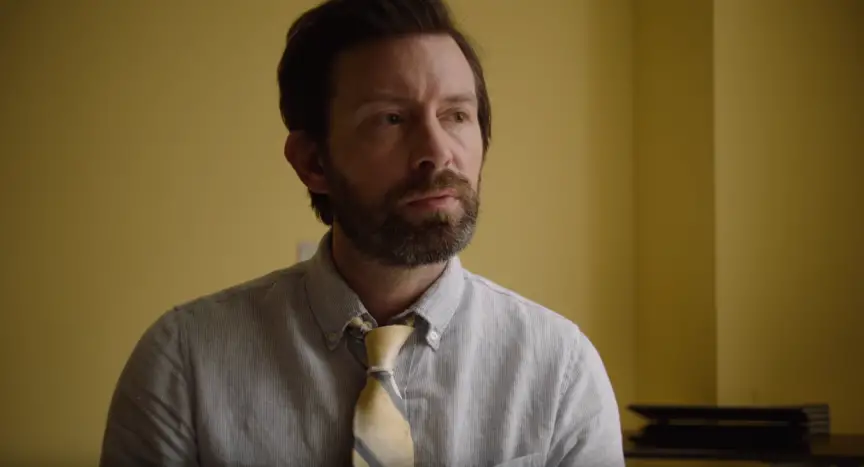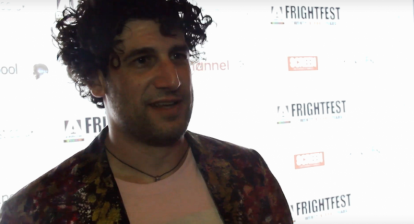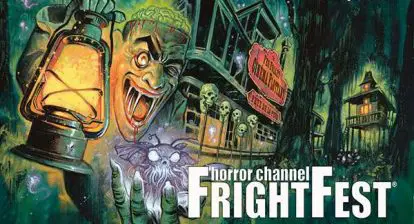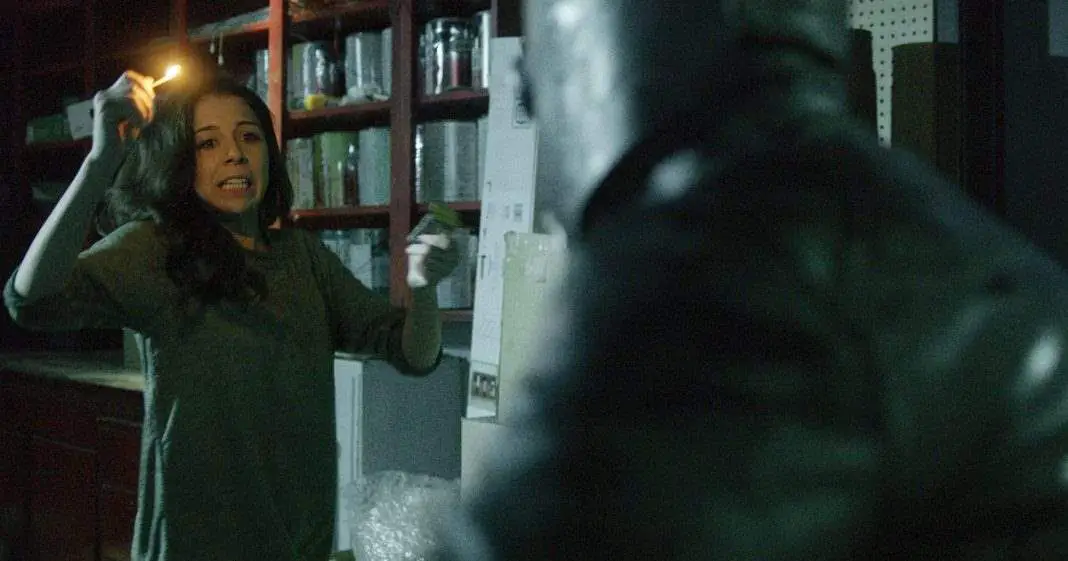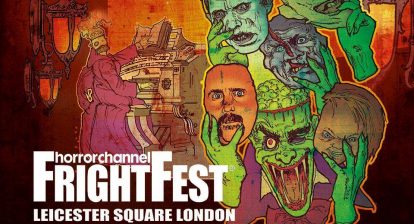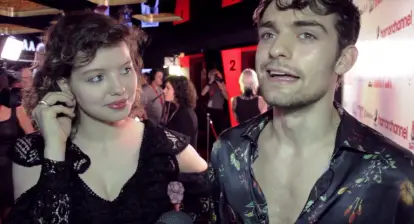In writer-director Billy Senese’s new film The Dead Center, writer-director-actor Shane Carruth (Primer, Upstream Color) stars as psychiatrist Daniel Forrester, a man of troubled disposition drawn deeper into darkness when he comes face to face with a strange man, like Lazarus risen from the dead, and carrying with him an unspeakable evil. The Dead Center will be released in UK and US cinemas, and on 4K Digital HD, on October 11, 2019. It will be available to purchase on DVD & Blu-ray from October 22 via Arrow Films Video.
Ahead of release, Wicked Horror had a chance to speak with Shane Carruth and to ask him about the film.
Also See: Actress Natalia Safran Talks Annabelle Comes Home [Interview]
Wicked Horror: First off we wanted to ask the basic question of how the project took root and how you became involved.
Shane Carruth: Billy [Senese] has a group of people around him and they reached out through my agency, who told him I don’t have a talent agent. And they shut him down. So Dennis, who is a producer on the film, reached out to me personally. So I read the script and I read it in one sitting — which is rare for me because I despise scripts. I found something in it that was really attractive: this out-of-frame darkness that is affecting this character Daniel and everything around him. And his journey is sort of like Heart of Darkness, Conrad, just going up the river. And, I told him “I’m in. Let’s do it.”.
WH: That was in my viewing of it too the element I gravitated towards most. Particularly the inexplicability, the lack of explanation for that darkness. Maybe you can speak a bit to the way in which it was visualized. It felt more in line with a genre cinema — the black and white flashes and everything — whereas the story was more grounded, maybe even something an analogue of contemporary event?
Shane Carruth: Ok…an analogue of contemporary events? Oh, do you mean like our political situation right now?
WH: Maybe. I think what I’m recognizing is that he [Billy Senese] didn’t seem to be going for a genre piece, per se. It really felt like character study, something with maybe not a political but — he treated the evil more like a disease than a presence, if that makes sense.
Shane Carruth: Yeah, totally. We had a lot of conversations, me and Billy. I’m trying to understand: what is a psychiatrist? How do they even work? There is this — I’m pulling it up as we talk — a wonderful documentary about Bellevue. What you see in the doc is that these doctors are being driven mad in the same way the patients are. They come in, they come out, they think they’re cured, they’re not. The colour scheme of that hospital is yellow and white to try to keep people calm, its soothing. Put them in a room, hope that after eight hours they come out of their manic state. Those are the kind of conversations we were having.
He [Billy Senese] put his team in there, this rundown building in Nashville, and painted the whole thing yellow. I don’t know if that answers anything.
WH: Of course, that’s really interesting to know that was the angle it was coming from. Because another thing I’ve been seeing a lot in looking up writing on the film is — particularly talking about your performance. Almost saying your strength as an actor here is in your ability to be indistinct, or lacking a clear character. Which I totally disagree with. Your character was very emblematic of the whole thrust of the movie, and that darkness within.
Shane Carruth: Wow, ok, that’s all new information to me.
WH: Sorry, I didn’t mean to drop something on you if —
Shane Carruth: No! No, it’s not you. Definitely. There are things that are not in the film that me and Billy talked about. Where is Daniel coming from? There’s some backstory about his mother committing suicide and basically him spending the rest of his life trying to undo that, understand it, see where that comes from. And then he gets hit with this John Doe guy. I guess that’s where my performance was coming from. He’s already in arrested development, so now he’s gotta try to help. He helps others in a way to help himself, really. It’s selfish. It’s gross. But that’s where I thought he was.
WH: That all came through, and also that his issues in his life seemed insurmountable, and then he’s faced with this thing with literally no explanation. I gathered he felt like he was screaming into the void. He didn’t feel he could help those patients…
Shane Carruth: Yeah, it’s processing. It’s triage. It’s not ‘helping’, it’s process. I don’t know, personally I see that in many avenues of life. [Sighs]
WH: Sorry if we’re going way too out there.
Shane Carruth: No, not at all, this is great. This is a conversation.
WH: It’s what I found more interesting in the film. The film was sent to us like it was a zombie thing. You know, “Shane Carruth stars in a zombie movie!” I said, that sounds bizarre.
Shane Carruth: [Laughs]
WH: That’s entirely not what it is. I don’t know if that’s just a marketing angle or —
Shane Carruth: No, I agree completely. I have no idea. This is one of the wonderful joys of being involved with this project. I’m an actor. That’s it. That’s all I did. So, I can say anything right now. I don’t care what the marketing team says, f*** it. You know, they want to sell it as a ‘horror thing’, they want to ‘win October’, they want to win the weekend — great, great for them. But no, that’s not what it is. Billy worked on this, he’s been working on things for a long while. He knows, he knows there’s something out screaming and he’s trying to capture it. I just wanted to be part of that.
Because I see it too, and I don’t have words for it. I’m not smart. So they can sell it however they want. But that’s not what it is. It’s a psychological drama. It is really inside the mindset of somebody who is lost. To me that’s key. Because I don’t think there’s a person on this planet who doesn’t feel like that once in a while. Or many times.
WH: So do you really feel that manifestation of evil is something fully personal and internal for him, rather than something broader?
Shane Carruth: Well, he’s reflecting the broader world. He’s reflecting what he saw. This is awesome, I love this so much: I’m an actor. I’m an idiot. What do I know? They wrote down the lines and I said them. [Laughs] I love it. And yet, here I am doing an interview as if I know anything.
I think Billy’s seen a lot of things in his life. And he’s had a lot of experiences and he translated them into a narrative that really shows an emotional state.
WH: I appreciate you for rolling with me, because I feel sort of the same way. Ok, he did a great performance, I think. But am I supposed to find out what the movie’s “about”? Or what the performance is “about”? I think we’re all lost at sea in the same way.
Shane Carruth: That’s good to hear. [Laughs] Let’s process that.
WH: Is there anything about the film you specially really want to tell people about? Or something you really find particularly interesting about it?
Shane Carruth: My favorite scene is when I wake up on the couch at the beginning. And the woman is singing “Happy Birthday” to me and I have to tell her it’s not my birthday. And knowing that all she’s doing right there is trying to show love, trying to show grace, and Daniel’s gotta be an a**hole. He’s gotta say “It’s not my birthday”. He blows her off. He doesn’t receive it. To me that broke my heart.
WH: Well, with that I’ll say thank you so much for joining in. I appreciate it all and I appreciate the film.
Shane Carruth: Thank you so much. I appreciate the time.
